'It's been a problem for nine years.. they still haven't learned their lesson'
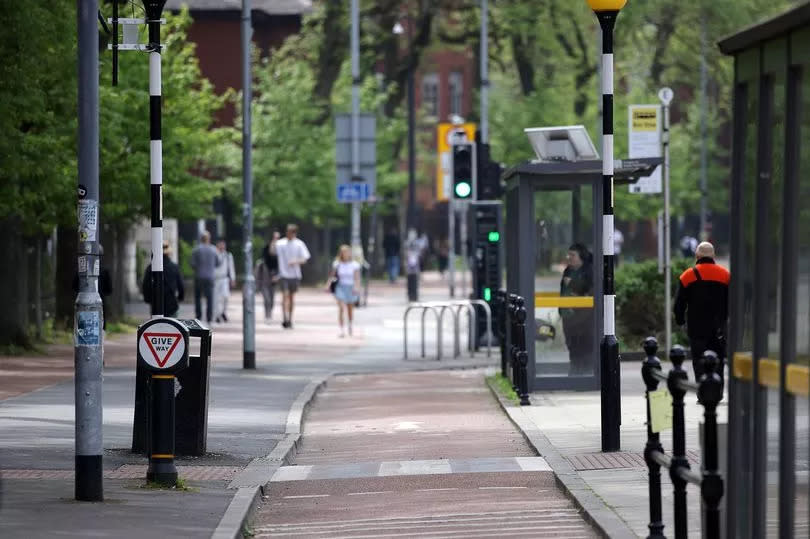
The implementation of a cycle lane wouldn't be a problem for most people. But for John Houston, who is visually impaired, it was to prove a grave danger.
His regular commute to work via Oxford Road into Manchester was thrown into chaos following a new cycle lane in 2015 and its zebra crossing. It meant he had no view of oncoming cyclists and could be left waiting for minutes at a time to be told by a passer by it was safe for him to cross.
The alternative would be to ‘risk it’ - something he was not willing to do.
READ MORE: Andy Burnham gives updates on TWO new tram lines in Greater Manchester
Most people could just look both ways for a cyclist and then just nip across. But for him that is not an option, he would be putting himself in danger by blindly stepping into the cycle lane, as a cyclist is difficult to hear.
Despite years of campaigning for change, it was only when he retired from his work as an IT consultant that the battle with the dreaded cycle lane ended.

The 70-year-old claims that despite everything he has campaigned for, this problem is continuing with a similar cycle lane scheme implemented in Castleton in Rochdale.
John explained that although the Oxford Road scheme is not associated with crossing to get a bus like in Castleton, there is still the feeling that the minority in society that are blind or partially sighted are being overlooked.
A spokesperson for TfGM said the design of the cycle lane and crossings at the junction with Grafton Street 'requires cyclists to stop for pedestrians.' They added that a member of the transport department had offered an invitation to meet with Mr Houston.
The former Didsbury resident would travel to the office near Manchester University via a pedestrian crossing just before Grafton Street next to the Manchester Royal Infirmary. He explained that this cycle lane, created in 2015, stripped him of his independence as he could no longer cross without being told it was safe to do so by someone with better sight.
John claims this problem for the visually impaired has been going on for years without change.
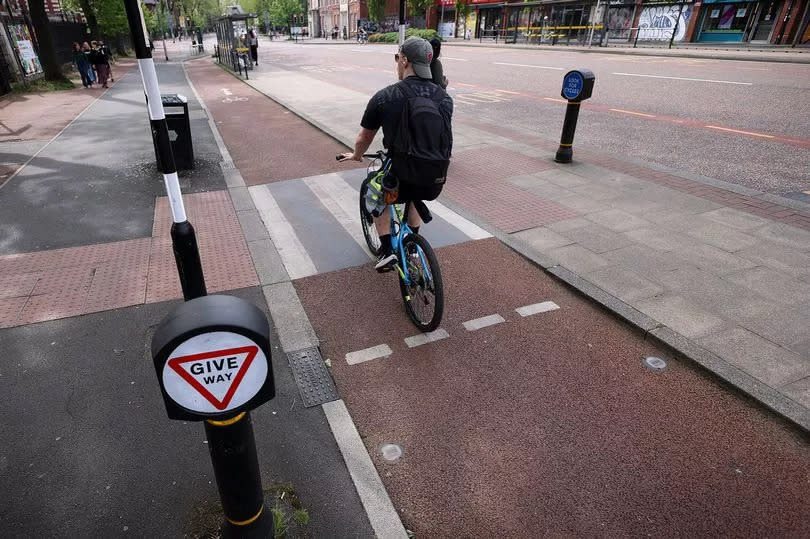
“My feelings on this are that this isn’t a new problem,” he said. “They call it a cycling and walking initiative, but it isn’t.
“This is just an irritant for the visually impaired. If you are visually impaired and want to cross a cycle lane you can’t hear them coming.
“We have evidence to prove that cyclists do not stop at the crossing. Nine years later and it is still a problem, it’s just irritating.”
The pensioner now lives in Hindley, Wigan, but claims he has contacted both Manchester Council and TfGM to flag the issues, but claims he got nowhere.
The retired IT worker said his local councillor at the time, Coun Andrew Simcock, waited at the crossing for one minute and 120 cyclists went past him without stopping.
Richard Nickson, programme director for active travel at TfGM, said: “We are sorry to hear about the concerns that Mr Houston has raised and we recognise that some people who are blind or visually impaired might not always feel safe when crossing a cycle lane.
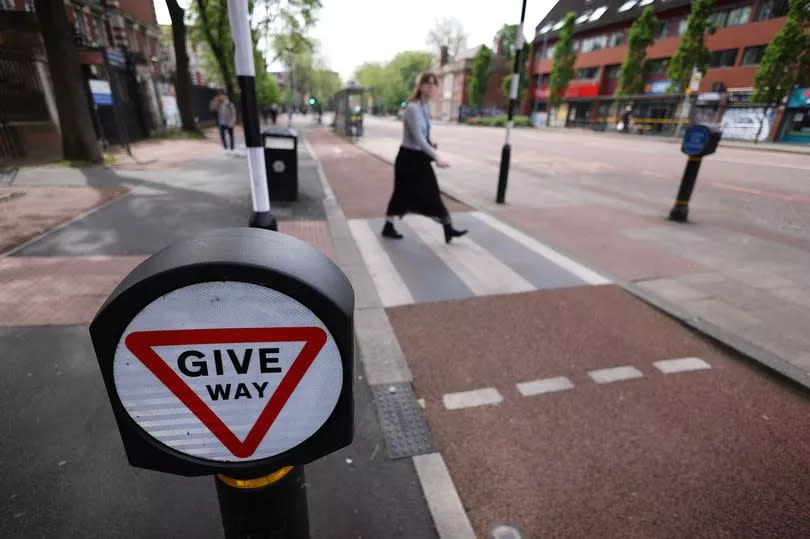
“The design of the cycle lanes and crossings at the junction with Grafton Street require cyclists to stop for pedestrians. It is important that people using the cycle lanes do so correctly, stopping when signals turn red for their lane, and with due consideration for all other road users as per the Highway Code.
In response to John’s concerns, which he contacted the council about over a period of two years, a spokesperson for Manchester Council said: “The council works with a range of representatives from groups to look at how concerns across our highways infrastructure can be addressed when it comes to accessibility.
“While signalled controlled crossings across cycleways cannot always be installed there are a range of other mitigations which are in place to promote safety for partially sighted or blind pedestrians. These include mini zebra crossings over the cycle lane, rumble strips to alert cyclists of a crossing as well as ‘SLOW’ markings painted on the surface.
"In this case, our executive member for environment and transport Coun Tracey Rawlins has extended an invitation to meet with Mr Houston to better understand his concerns."
Not just a Manchester problem
John spoke to the M.E.N after seeing history repeat itself with the experience of Kevin Greenan, a blind man from Rochdale who said he feared getting the bus in Castleton due to the cycle lanes.
Kevin claims that the newly implemented cycle scheme in Castleton means that people have to cross a cycle lane to get on a bus - which he claimed is dangerous, particularly for the visually impaired.
The Rochdale local pointed out a number of flaws with the newly completed cycle lane that runs on both sides of Manchester Road in the village of Castleton. The 69-year-old, one of the three in every hundred people in the UK living with sight loss, called on all council and transport bosses behind the scheme to walk with him blindfolded so they could understand what it was like to walk in his shoes.
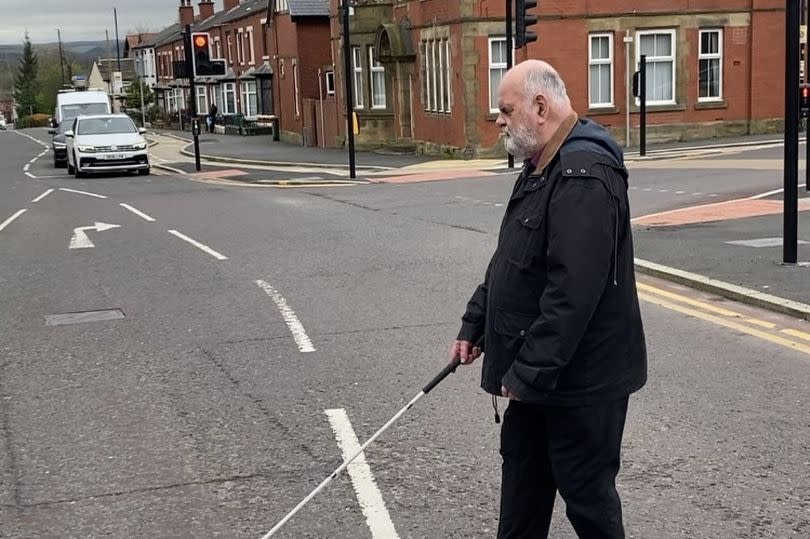
“This is a different issue to Castleton but it’s the same problem,” John added. “They haven’t learned their lesson in nine years.
“I was hammering them since its creation in 2015 but six months later, after initial responses, I just didn’t get a reply.
“They are not interested, they sometimes make a token gesture like offering a camera system that signifies when a cyclist is coming, but they haven’t done anything about that for the last two years anyway.”
John who is partially sighted and Kevin who is completely blind, have both worked with Sarah Gayton, a National Federation of the Blind UK (NFBUK) campaigner, to try and get TfGM to make changes to their designs.
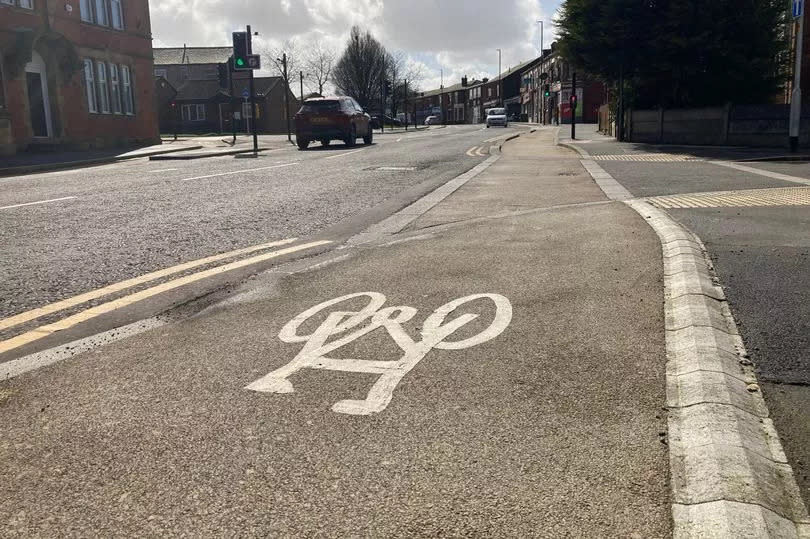
Their concern is that these schemes will continue to be rolled out across the region without the consideration of those without full vision. Both men have said these schemes have taken away their independence - which they do not want to see continued.
'Words totally fail'
Sarah Gayton said: “It is absolutely scandalous how the new cycle lanes have been rolled out across Greater Manchester with no realistic consideration on how blind, visually impaired, disabled and older bus passengers would be able to use the bus in safety with the use of floating bus stops and shared use bus boarders in the new schemes.
“This is where the cycle lane is routed between the pavement and the bus stop with passengers expected to cross a cycle lane to catch a bus or where passengers are expected to step on and off the bus into a live cycle lane. Both designs are not safe and are not accessible for blind and visually impaired people to use independently.
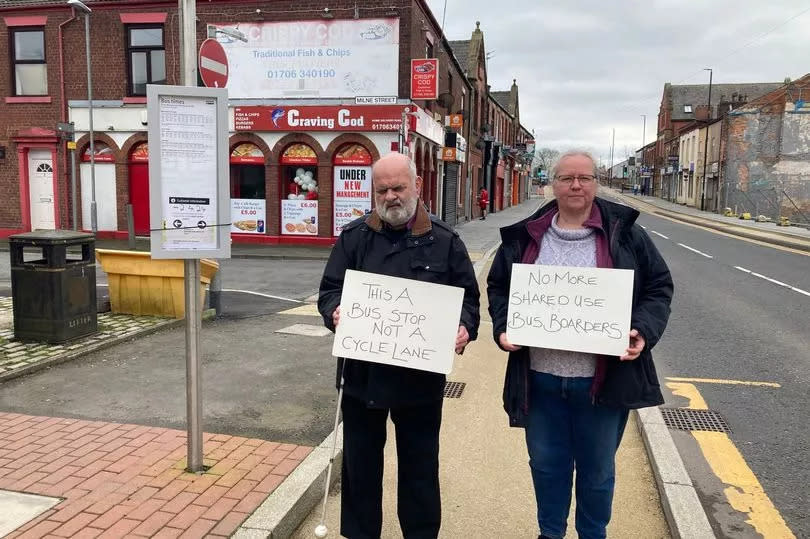
“Words totally fail, on learning that John, who is visually impaired and who lives in Manchester, has been trying for nine years to get his voice heard on this issue. It has angered us greatly too, as the National Federation of the Blind of the UK (NFBUK) alerted Chris Boardman, the former Greater Manchester Cycling and Walking Commissioner, to the dangers of these bus stop designs back in a meeting held August 2018.”
Sarah went on to say that the NFBUK provided detailed objections to the Chorlton cycle lane scheme in early 2019 over the designs, and had a further meeting with officials from TfGM in April 2019 to further explain why these new designs of bus stops did not work for blind and visually impaired bus passengers. She claimed that the Chorlton cycle lane scheme is just as problematic, another example of a scheme that would impact on blind people.
Richard Nickson, programme director for active travel at TfGM, added: "Greater Manchester has been trialling solutions such as zebra crossings at side roads, and other technological aids to provide a ‘safe to cross’ indicator for visually impaired pedestrians at the crossings of cycle tracks. We are pressing the national government to enable us to take both of these trials further on a more widespread basis and working closely with Active Travel England in doing so.
“As we build and expand the Bee Network, we want to make sure that walking, wheeling and cycling infrastructure and the links to public transport are accessible for everyone. We will continue to work closely with local authorities to engage with the public and representative groups, such as the RNIB and other charities, on future schemes.”

 Yahoo News
Yahoo News 
